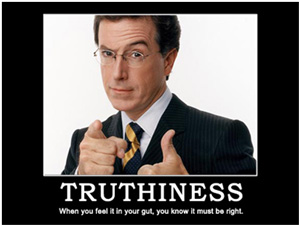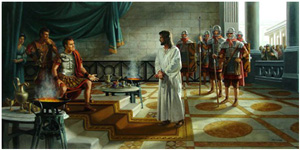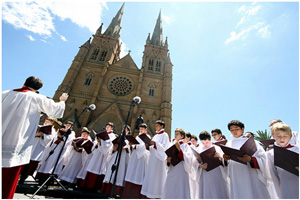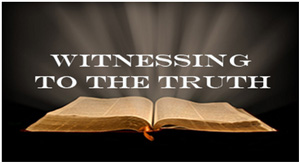Homily for Mass of the Solemnity of Our Lord Jesus Christ, King of the Universe, Year B, St Mary’s Cathedral, Sydney

Introduction to Mass of the Solemnity of Our Lord Jesus Christ, King of the Universe, Year B
St Mary’s Cathedral, Sydney, 22 November 2015
Welcome to today’s Mass for the Solemnity of Christ the King. Today our liturgical year comes to its close and we celebrate the One who rules in our Church and in our hearts. Two of our young choristers will be confirmed on this great feast and I acknowledge them, their sponsors, families and friends.
In the past ten days there have been terrorist attacks in Lebanon, Iraq, France and now Mali. In recent times millions have been murdered, wounded, raped, driven into exile in what the UNHCR calls “the worst humanitarian crisis of our era”. In the lands nearest those walked by Christ and in which the Church grew up, there have been continuous Christian communities for two millennia; if Daesh get their way there will be none left before this decade is out. Happily our Government has pledged to welcome 12,000 additional refugees from this crisis taken especially from the minorities most at risk. But governments cannot do everything: we too must help! Today the Archdiocese launches its Syrian Refugee Appeal through CatholicCare Sydney and our Justice and Peace Office. This will give our parishes and individual faithful the chance to offer financial donations, accommodation and other parish-based support activities; the archdiocese will offer assistance through its schools, healthcare, welfare and other services. Information about this appeal will be available in the Bulletin and via the archdiocesan website.
To everyone present on this happy feast, including overseas visitors and more regulars, a very warm welcome!
Homily for Mass of the Solemnity of Our Lord Jesus Christ, King of the Universe, Year B,
St Mary’s Cathedral, Sydney, 22 November 2015
These days words can pop into the English lexicon before our eyes. So, for example, the proper noun ‘Google’ has become a verb: ‘to google’ something means to search for it on the internet. The word comes from another word coined in 1940: ‘googol’ is the number one with a hundred noughts after it. Another word that has recently entered political and social discourse is ‘truthiness’. It was made popular by American comedian Stephen Colbert, who recently replaced David Letterman on CBS’ Late Show.Though only ten years old, the word is already in common usage and in the dictionaries.

Google the word ‘truthiness’ and you’ll find it means something that seems or feels true but may not be. In popularising it Colbert was lamenting that facts seem not to matter anymore in politics or society; that nowadays perception is everything. To call something true is to say hooray and to say something is false is to say boo. True means feel-good, I like it, it’s what my gut says is true, it’s what I’d like to be true. So, says Colbert, truthiness refers to a subjective, emotional, ultimately selfish state. So much for thousands of years of philosophical debate about whether thoughts, beliefs or assertions had to correspond to the facts or state what is the case to be true, or had to cohere with other things believed to be true, or had to ‘work’ in some pragmatic sense: as Colbert observes: “What’s important today? What you want to be true.”
We are not the first people to be sceptical about truth. Pontius Pilate – well-educated citizen and powerful ruler in the Roman empire – once famously asked: “What is truth?” (Jn 18:38) What prompted him to ask this was Jesus’ claim in today’s Gospel passage that He had come into the world “to bear witness to the truth”. Truth, Pilate wonders, is there really such a thing? Are you really bearing witness to anything, to anyone, that matters objectively speaking? Is your guilt or innocence which I’m about to judge really a matter of fact, or just my personal preference, just what suits my holding onto power?
Many people today are tempted to side with Pilate on this. Apart from empirically verifiable, scientific facts, they’d say the rest is opinion. If you can’t see and measure something, it’s just opinion. You think your opinion is true; I think mine is. You have your truth; I have mine. Hopefully we can live-and-let-live and not go to war over it. But in the end there’s no objective truth, no correspondence between what’s ‘in here’ and what’s ‘out there’, no truth we can share and so hold in common apart from that which we negotiate or have imposed upon us.

Jesus today makes a radical counter-claim. Yes, He says, there is truth and He testifies to it. Indeed, the truth to which He testifies grounds all Truth: God the Father. And Jesus, too, is I-am (Jn 6:35,48; 8:12,58; 9:5; 10:9,11; 11:25; 14:6; 15:1), God the Son, the reality that underwrites all that is, visible and invisible. “I am the Way, the Truth, and the Life,” He says (Jn 14:6); I am the Word; the Word of truth; the incarnation on earth of the divine truth of heaven. To receive Him is to receive that which is truest, most beautiful, best. And so we Christians must be absolutely clear in our own minds that there are some things that are true and knowable and shareable, that there are some people who speak the truth, that there is Someone not just with the feeling of truthiness about Him but who is Truth itself.
Today we celebrate that Someone, Christ as a King whose reign is the reign of truth. Anything we think or say or do, if it is to be true, must correspond to Him, must cohere with what He says, must work for the building up of that Kingdom in which he rules. When the prophet Daniel dreams of “One of great age” conferring eternal “sovereignty, glory and kingship” on a “son of man” (Dn 7:13-14), when the Father confirms that Jesus is that Son of Man at the Jordan, at the Transfiguration and at the Sepulchre of Resurrection, He gave a resounding, cosmic answer to the question what is truth?

Looking around at our world sometimes, as we contemplate the terrorist acts reverberating around our globe and disturbing everyone’s peace, we might be tempted to think the words of truth spoken by Christ are something airy-fairy, theoretical, for some remote future. To talk, as the beautiful Preface to our Eucharistic Prayer does, of “a kingdom of truth and life, of holiness and grace, of justice, love and peace” can sometimes seem at best wishful thinking if not a forlorn hope. Yet even if this Feast anticipates a future not yet fulfilled, yet to the Risen Christ has already been given “all authority on heaven and earth” (Mt 28:18) and His reign has already begun amongst us.
Some faiths would have God dominate the world by the exercise of raw, arbitrary power. Such a God is Pontius Pilate writ large. He does not know, does not care, what is truth, what is innocence or guilt. But the One who has come to bear witness to the Truth, the One who reveals Himself as Truth itself, seeks not to coerce but to persuade, to propose what is true rather than impose what is powerful. And those who are touched and persuaded by Him are converted in their perceiving and thinking and doing already now. So His kingdom has already come amongst us, even if it is still spreading, still to be fully realized (cf. 1Cor 15:25).
Who, then, shall be citizens, not of Rome but of the kingdom of God? Who is persuaded of such nationality, volunteers for such service? Two boys from our cathedral choir raise their hands for this today. By asking to be Confirmed they declare: Truth? I know what is truth. I know who is Truth. You are Truth, Lord Jesus Christ, Universal King, my king. And I want to be part of your kingdom. I want to serve there. Give me the gifts I need. You promised us the Spirit of Truth (Jn 14:17,26; 15:26; 16:13; cf. Rom 8:9; 1Jn 2:27; 3:24; 5:6); pour that Holy Spirit out upon me today. Make me, in turn, a witness to the truth (Jn 15:27; 19:35; 21:24; Rom 1:9; 9:1; 3Jn 1:12).

Sponsors, teachers, fellow choristers and parishioners, family and friends of our candidates: continue to support them in their new task to be witnesses to the Father who is the Author of Truth; witnesses to the Son who is the Way, the Truth and the Life; witnesses in the Spirit who is the Spirit of Truth. Help them apply the gifts of the Holy Spirit in lives of Christian faith and practice, of virtue and holiness, of the worship of God and love for all.
Jonathan and Ivan: when I anoint you with the Spirit of Truth, you can be sure that God will give you all the gifts you need to be true citizens of His Kingdom. Resolve now to stand up for the truth in all you say and do; to participate in the Sacred Liturgy not just with your beautiful voices but with your hearts and minds also; to pray and confess and do good things for others. As testament to your citizenship in the Kingdom of Christ stand up now and proclaim the anthem of Christ’s kingdom that is the Creed.

